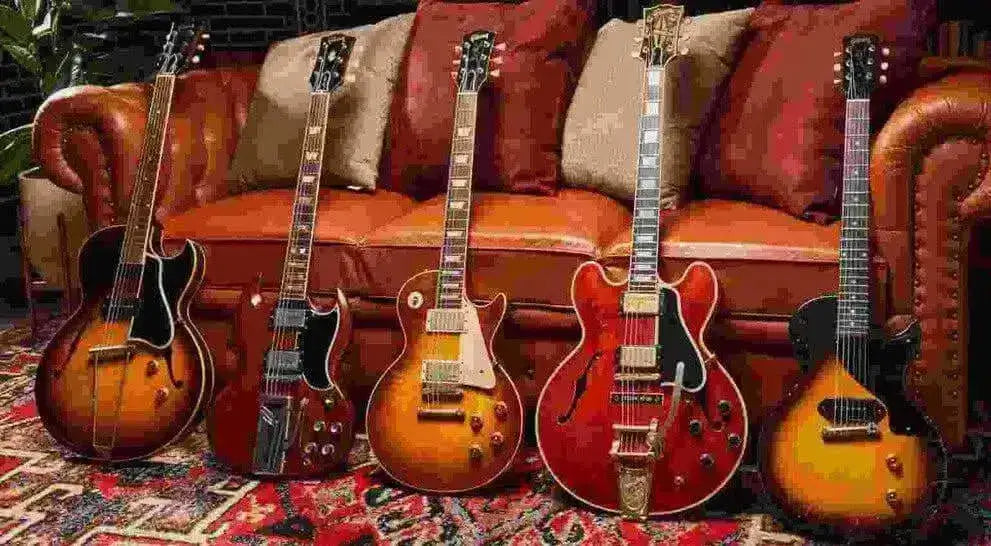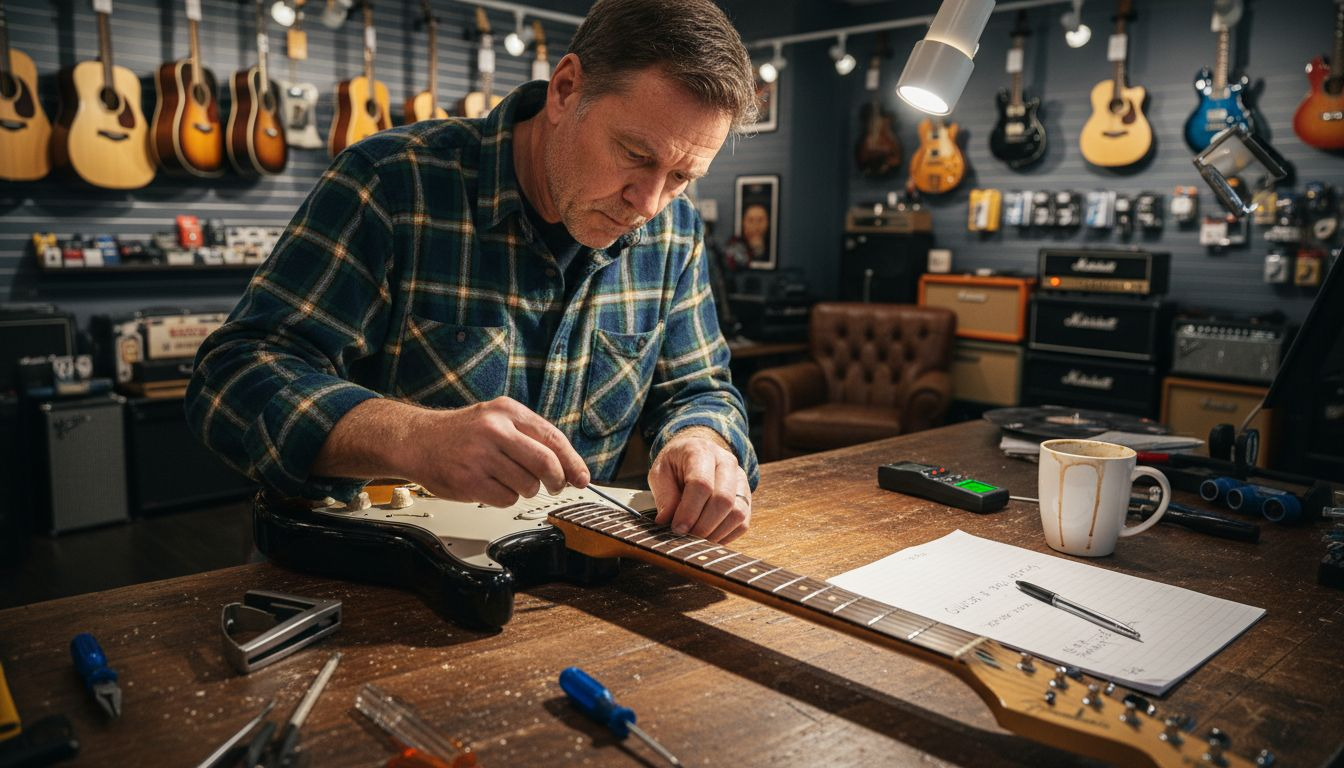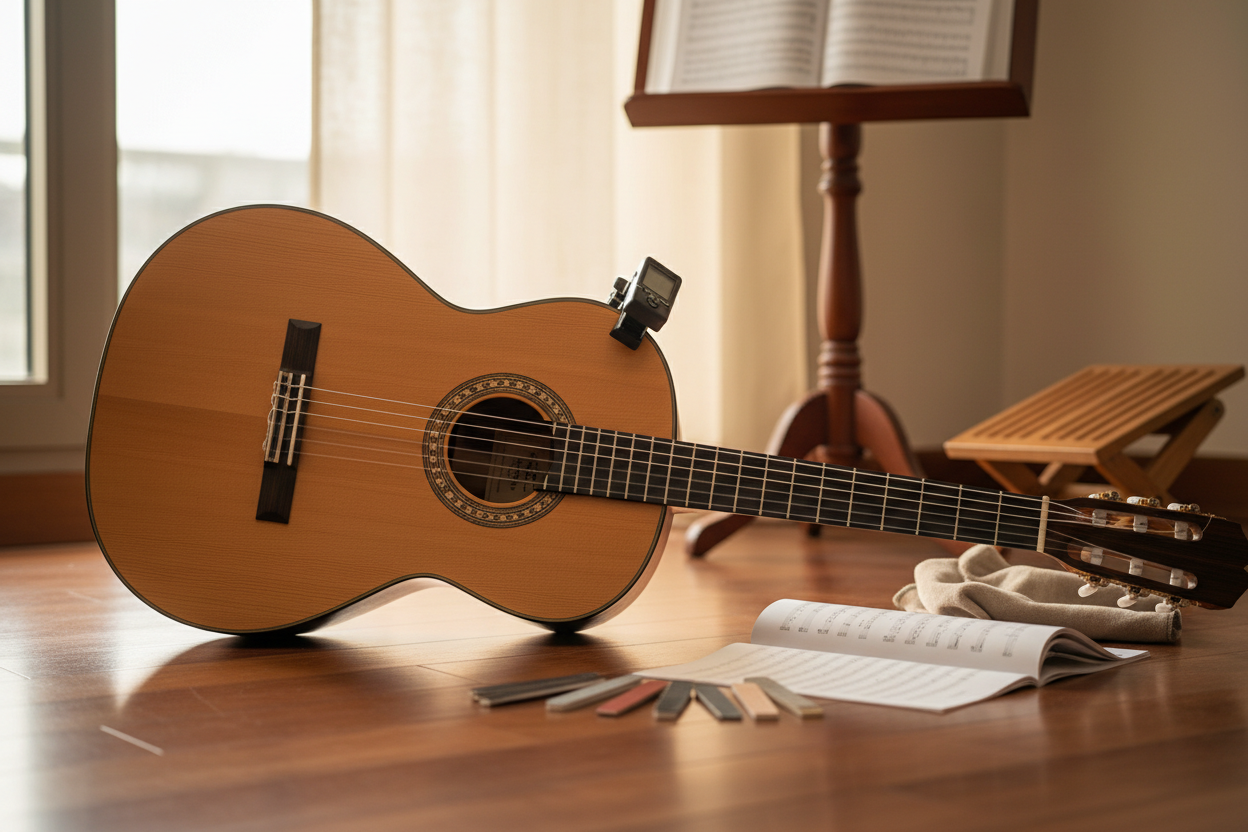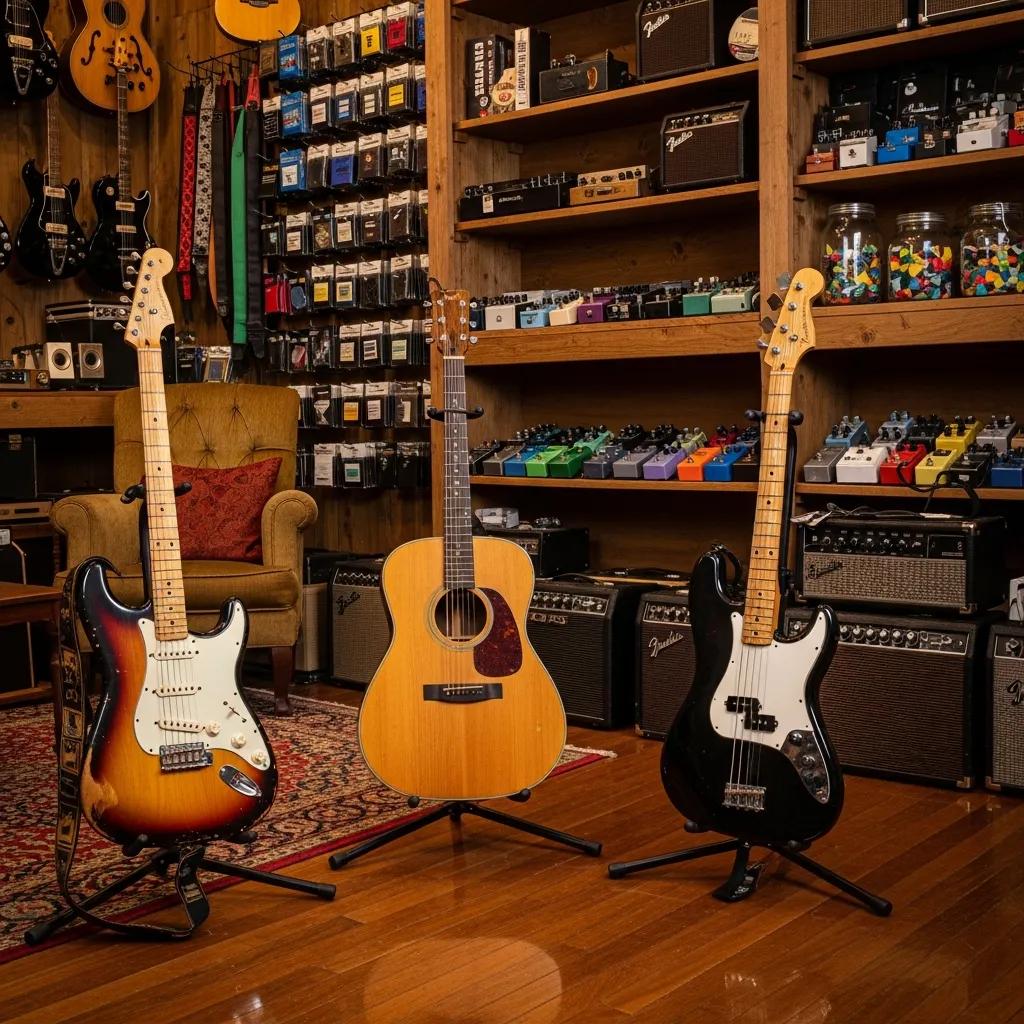Are you feeling overwhelmed by the sheer number of choices when it comes to choosing a guitar? Finding the perfect guitar can be a daunting task, whether you're a complete beginner or a seasoned musician looking to expand your collection. In this blog, we’ll guide you through everything you need to know to make an informed decision.
From understanding the intricacies of guitar construction to identifying the best guitar to buy for your specific needs, we cover all the essential factors that will help you discover your ideal guitar. Read on to uncover the tips and insights that will help you find a guitar that truly matches your playing style and musical aspirations.
Choosing the right guitar can be an overwhelming task, especially for beginners. With so many options available, it's important to consider your personal preferences, playing style, and budget. we will try to guide you through the process of picking the perfect guitar for you.
What is your playing style?
The first step in choosing a guitar is to determine your playing style. Are you interested in playing acoustic or electric? Each type of guitar has its own unique sound and characteristics. Acoustic guitars are great for folk, country, and singer-songwriter styles, while electric guitars are more commonly used in rock, metal, blues, and jazz genres.
What is your skill level?
Consider your skill level when choosing a guitar. If you're a beginner, it's best to start with a guitar that is comfortable to play and easy to handle. If you're small then Look for guitars with a smaller body size and a shorter scale length. These features will make it easier for you to learn the basics and build your skills.
What is your budget?
Set a budget for your guitar purchase. Guitars come in a wide range of prices, so it's important to determine how much you're willing to spend. Keep in mind that higher-priced guitars often offer better quality and sound, but there are also great options available at lower price points.
Try before you buy
Before making a final decision, it's crucial to try out different guitars. Visit a guitar shop and play a variety of guitars to see which one feels and sounds the best to you. Pay attention to the comfort of the neck, the action (the distance between the strings and the fretboard), and the overall sound quality. Don't be afraid to ask for assistance from the store staff—they can provide valuable insights and recommendations.
Consider the guitar's construction and materials
When choosing a guitar, pay attention to its construction and materials. With Acoustic guitars, solid wood generally offer better sound quality and resonance compared to laminated wood guitars but not always the case, if you do find a laminate guitar which you like the sound of it's likely to sound that way for a long time. The type of wood used for the top, back, and sides of the guitar can also affect its tone. Common tonewoods include spruce, cedar, mahogany, and rosewood..solid top guitars generally sound nicer the more they're played and the wood opens up
Additional features and accessories
Consider any additional features or accessories you may need. For example, if you're interested in playing acoustic guitar, you may want to invest in a built-in pickup system for amplification. Electric guitar players may need to purchase an amplifier, cables, and effects pedals. These additional items should be factored into your budget.
Remember, choosing a guitar is a personal decision. Take your time, do your research and don't always rely on other peoples reviews (it's possible that some influencers are paid to give glowing testimonies on guitars they have no experience of), trust your instincts. With the right guitar in your hands, you'll be on your way to creating beautiful music.
Understanding Different Guitar Types
When choosing the perfect guitar, understanding the differences between types of guitars is essential. The two primary types are acoustic guitars and electric guitars, each with its own features, sound, and ideal playing style.
Acoustic Guitars
Acoustic guitars produce sound naturally from the vibration of the strings and the body. They are perfect for genres like folk, country, classical, and pop. Within acoustic guitars, there are several types:
- Classical Guitars: Often used for classical music and flamenco, they have nylon strings that produce a softer, mellow sound.
- Steel-String Guitars: Ideal for folk, rock, and country music, they have a brighter sound and are more versatile.
- Jumbo or Dreadnought Guitars: These have a larger body and produce a louder, more resonant sound, suitable for rhythm playing.
Electric Guitars
Electric guitars require an amplifier to project sound and are commonly used in rock, blues, jazz, and metal. Key types include:
- Solid Body Guitars: Versatile and widely used, these guitars offer a wide range of sounds with minimal feedback.
- Hollow Body Guitars: Known for their warm, full tone, ideal for jazz and blues.
- Semi-Hollow Body Guitars: Offer a mix of solid and hollow body characteristics, providing both warmth and reduced feedback.
Choosing Based on Body Size and Shape
Why Body Size Matters
The body size and shape of a guitar significantly impact comfort and sound quality. Smaller-bodied guitars are easier to handle, especially for beginners, children, or people with smaller frames. Larger-bodied guitars, like dreadnoughts, produce a louder and fuller sound but may feel bulky.
Popular Guitar Shapes and Their Uses
- Parlor Guitars: Small, lightweight, and ideal for fingerstyle playing or travel.
- Concert and Grand Concert: Medium-sized guitars that offer a balanced tone and are suitable for fingerpicking and light strumming.
- Auditorium and Grand Auditorium: Slightly larger than concert guitars, offering more volume and a rich tone, suitable for all styles.
- Dreadnoughts: Known for their deep bass and loud volume, ideal for strumming and flatpicking.
Guitar Neck Profiles: What to Know
The neck profile, or shape of the neck, affects playability and comfort. The three main types are:
- C-Shape Neck: A common, comfortable shape suitable for most players, especially beginners.
- V-Shape Neck: Offers a pronounced ridge along the back of the neck, which can suit players who like to rest their thumb along the spine.
- U-Shape Neck: A thicker neck profile that provides support and is preferred by players with larger hands or those who play aggressive styles.
Understanding Guitar Pickups
For electric guitars, the type of pickup affects the tone and versatility:
- Single-Coil Pickups: Produce a bright, crisp sound with more high-end detail. They are great for rock, country, and blues.
- Humbucker Pickups: Offer a warmer, fuller sound with less noise interference, ideal for rock, jazz, and heavy metal.
- P90 Pickups: A single-coil pickup with a wider coil, providing a mix of the bright sound of single-coils and the warmer tone of humbuckers.
Considering Your Playing Environment
Home Use vs. Live Performance
- If you mostly play at home or in small venues, a smaller, more portable guitar may be more practical.
- For live performances, consider the type of amplification and whether the guitar has built-in electronics, such as a preamp for acoustic-electric models.
Setting Up Your Guitar: The Basics
Proper setup is crucial for any guitar, new or used. This includes adjusting the string height (action), intonation, and neck alignment to ensure optimal playability.
- Action: Adjust the height of the strings from the fretboard to reduce finger strain and avoid buzzing.
- Intonation: Ensure the guitar plays in tune across the entire fretboard.
- Truss Rod Adjustment: Adjust the tension in the neck to maintain the correct curvature and prevent warping.
- Upgrading Your Guitar: What to Consider
Conclusion
Finding the perfect guitar is a personal journey that depends on your unique preferences, playing style, and budget. By considering the type of guitar, understanding its construction, and evaluating your skill level and musical goals, you can confidently choose the best guitar to buy for your needs. Remember, there is no one-size-fits-all answer when it comes to the ideal guitar, it's all about what feels right in your hands and sounds great to your ears. Take your time, try different models, and trust your instincts. With the right guitar, you're not just making a purchase; you're investing in your musical journey.
At MusicStreet, we’re passionate about helping you find the perfect guitar that matches your style and needs. With our extensive range of guitars, expert advice, and personalised service, we're here to make your journey to discovering the ideal guitar smooth and enjoyable. Whether you’re just starting out or looking to upgrade, our team is dedicated to ensuring you choose the best guitar to buy. Visit MusicStreet today, and let us help you play your best!
Find your sound, feel the music, and make it yours with MusicStreet – where your musical journey begins.
Frequently Asked Questions
How do I know if a guitar is the right size for me?
Choosing the right guitar size is important for comfort and playability. If the guitar feels too big or heavy, or if you struggle to reach the strings or frets, it might be the wrong size. Try different sizes at a store to find one that fits comfortably in your hands and against your body.
What should I do if my guitar strings keep breaking?
If your guitar strings break frequently, it could be due to rough fret edges, improper tuning, or even old strings. Check for sharp edges on the frets or bridge, make sure you’re tuning the guitar correctly, and replace strings regularly to prevent breakage.
Why does my guitar sound out of tune even after I’ve tuned it?
If your guitar sounds out of tune despite proper tuning, it may need an intonation adjustment. This involves fine-tuning the length of each string to ensure they play in tune across the fretboard. Visit a guitar technician or learn to adjust the intonation yourself.
How can I stop my guitar from producing a buzzing sound?
Buzzing sounds can result from low action (strings too close to the fretboard), worn frets, or uneven fret height. Adjust the action by raising the bridge or take your guitar to a professional for a setup to correct any fret issues.
What should I do if my guitar feels uncomfortable to play for long periods?
If your guitar feels uncomfortable, try adjusting your playing position, strap length, or posture. You might also need a different neck shape or body size. If discomfort persists, consider trying out different guitars to find one that fits better.
How do I care for the wood of my guitar to prevent damage?
Guitars are made of wood, which can warp or crack if exposed to extreme temperatures or humidity. Store your guitar in a cool, dry place, use a humidifier in dry conditions, and regularly clean the wood with a suitable polish to maintain its condition.
What can I do if my guitar’s electronics stop working?
If the electronics on your electric guitar (like pickups or volume knobs) aren’t working, check the connections and make sure the cables are secure. If you hear crackling or there’s no sound, it could be a wiring issue that needs professional repair.




Share:
What makes the ultimate guitar?
Guitar Heroes: Uncovering the Secrets of Legendary Players and Their Signature Styles Save